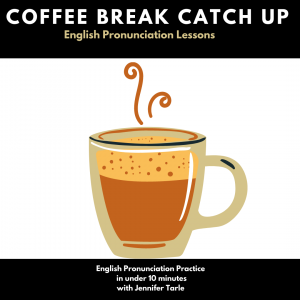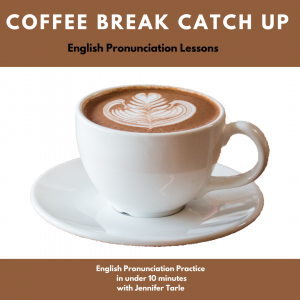Jennifer Tarle's Blog, page 18
May 24, 2022
How to Pronounce WEED & WE’D – American English Homophone Pronunciation Lesson
Learn how to pronounce the words WEED & WE’D with this American English Homophone Pronunciation Lesson. These words are homophones and are pronounced exactly the same way.
Definitions:A weed is a wild, unwanted, invasive plant or to remove plants.
We’d is the contraction of we had.
Pronunciation:These words are pronounced W-long E- D or /wid/.
Sentence:We’d like to weed. We’d get rid of all of the weeds.
This may be helpful:HOMOPHONES – words spelled differently but pronounced the same
Transcript:Hi everyone!
Jennifer from Tarle speech with your two for Tuesday. Our words today are spelled differently, they have different meanings, but they are pronounced the same. The words are:
weed a wild unwanted invasive plant or it can mean to remove plants
and we’d we had the contraction
So let’s give these words a try.
Three little sounds today – easy breezy!
Start with that w sound – puckered lips.
Move to that long e – smile and that tongue is nice and high and flat: e.
And then touch the tip of your tongue to the back of your top front teeth for that d sound. D Let it pop down, let the air puff out, all while your voice box is on. In fact your voice is on for this whole word
W-e-d
weed weed weed
weed weed weed
weed
And now for a sentence:
We’d like to weed, we’d get rid of all of the weeds.
Give it a try I know people are going to notice the difference! Share us with your friends. Give us a like if you are so inclined and visit us at Tarle speech if you need more help.
Thanks everyone take care!
The post How to Pronounce WEED & WE’D – American English Homophone Pronunciation Lesson appeared first on Tarle Speech.
How to Pronounce WEED & WE’ED – American English Homophone Pronunciation Lesson
Learn how to pronounce the words WEED & WE’D with this American English Homophone Pronunciation Lesson. These words are homophones and are pronounced exactly the same way.
Definitions:A weed is a wild, unwanted, invasive plant or to remove plants.
We’d is the contraction of we had.
Pronunciation:These words are pronounced W-long E- D or /wid/.
Sentence:We’d like to weed. We’d get rid of all of the weeds.
This may be helpful:HOMOPHONES – words spelled differently but pronounced the same
Transcript:Hi everyone!
Jennifer from Tarle speech with your two for Tuesday. Our words today are spelled differently, they have different meanings, but they are pronounced the same. The words are:
weed a wild unwanted invasive plant or it can mean to remove plants
and we’d we had the contraction
So let’s give these words a try.
Three little sounds today – easy breezy!
Start with that w sound – puckered lips.
Move to that long e – smile and that tongue is nice and high and flat: e.
And then touch the tip of your tongue to the back of your top front teeth for that d sound. D Let it pop down, let the air puff out, all while your voice box is on. In fact your voice is on for this whole word
W-e-d
weed weed weed
weed weed weed
weed
And now for a sentence:
We’d like to weed, we’d get rid of all of the weeds.
Give it a try I know people are going to notice the difference! Share us with your friends. Give us a like if you are so inclined and visit us at Tarle speech if you need more help.
Thanks everyone take care!
The post How to Pronounce WEED & WE’ED – American English Homophone Pronunciation Lesson appeared first on Tarle Speech.
May 23, 2022
Coffee Break Catch Up – Week in Review: May 16, 2022 – Tarle Speech English Pronunciation
Tarle Speech English Pronunciation Lesson Review
Videos from the week starting Monday, May 16, 2022Catch up on missed lessons from last week. This pronunciation practice takes less than 10 minutes. Try it! People will notice a difference.

Two for Tuesday Homophone Lesson
How to Pronounce MIST & MISSED – American English Homophone Pronunciation Lesson
Viewer Question of the WeekHow to Pronounce NATURE & NURTURE – American English Pronunciation Lesson
Weekend #Shorts Quick English Pronunciation LessonsHow to Pronounce ORCHID – #SHORTS Quick English Pronunciation Mini Lesson
How to Pronounce ZINNIA – #SHORTS Quick English Pronunciation Mini Lesson
Playlist of the WeekFlowers – American English Pronunciation Lessons
The post Coffee Break Catch Up – Week in Review: May 16, 2022 – Tarle Speech English Pronunciation appeared first on Tarle Speech.
Coffee Break Catch Up – Week in Review: May 23, 2022 – Tarle Speech English Pronunciation
Tarle Speech English Pronunciation Lesson Review
Videos from the week starting Monday, May 23, 2022Catch up on missed lessons from last week. This pronunciation practice takes less than 10 minutes. Try it! People will notice a difference.

How to Pronounce WEED & WE’ED – American English Homophone Pronunciation Lesson
Viewer Question of the Week:How to Pronounce BRIDGE & BREACH – American English Pronunciation Lesson
Weekend #Shorts Quick English Pronunciation Lessons:How to Pronounce YOSEMITE – #SHORTS Quick English Pronunciation Mini Lesson
How to Pronounce ORCHARD – #SHORTS Quick English Pronunciation Mini Lesson
The post Coffee Break Catch Up – Week in Review: May 23, 2022 – Tarle Speech English Pronunciation appeared first on Tarle Speech.
May 20, 2022
How to Pronounce NATURE & NURTURE – American English Pronunciation Lesson
Learn how to pronounce the words NATURE & NURTURE with this American English Pronunciation Lesson.
Definitions:Nature: basic inherent features or characteristics
Nurture: care and encouragement of development
Pronunciation:Nature: /neɪʧər/
Nurture: /nɜrʧər/
Transcript:Hi it’s Jennifer from Tarle Speech with your question of the week.
We have two words today:
nature which is basic inherent features or characteristics and
nurture which is the care and encouragement of development
These words look very confusing because the spellings are almost the same. But this is a fairly easy lesson. Both of these words end with cher. So let’s get that out of the way. To say the ch sound you’re going to start with the t sound ttt and then you’re going to pull your tongue back. And as you pull your tongue back, it’s going to end in that sh sound sh sh sh
Here’s the trick! You have to do that very quickly and make it a new sound. For some of you who are new to my channel ch is two letters representing one sound. There’s no h in this sound. So let’s try this ch. Touch the teeth and then pull the tongue back. Ch ch ch
You can see my lips are kind of rounded a little bit. They’re in a little bit of that square tense lip shape. And the reason they’re there is I’m getting ready for that er and for that er sound the tip of your tongue is either pointed down to the bottom of the mouth or flipped back. Back of the tongue is pulled way high up and is really tense and strong. And the key is, is that you do not want to move the tip of your tongue to trill that r or to tap that r. So keep it nice and stable and try to make that er at the end longer and stronger.
Okay let’s put this all together cher cher cher
OK! We’re halfway there.
Now for nay what you’re going to do is you’re going to start with that n: nnn. Air moves out of your nose and your tongue is touching the back of your top front teeth or to be super specific the little spot where your teeth meet the skin on the roof of your mouth. Then you’re going to move to that long a sound. And to do that, open wide, tongue will be low, and then move to a smile and your tongue will be nice and high and flat a a a.
nay
And then for the ner in nurture, again, start with that n. Air moves out of your nose and then you’re going to add that er. Again to review tip of the tongue is down or flipped back. Back of the tongue is way high up and tense. er Nice square lips, square and tense, ner.
Now let’s put those all together:
na-cher
nature nature nature
nur-cher
nurture nurture nurture
nature nurture
nature nurture
And now for a sentence:
What is more important to a person’s success: nature or nurture?
Let me know what you think in the comments section below and give it a try people are going to notice the difference!
If you found this helpful please keep sharing us with your friends and give us a like. If you have time and if you need more help, you can check out our products and our classes at Tarle speech.
Thank you all have an amazing weekend!
The post How to Pronounce NATURE & NURTURE – American English Pronunciation Lesson appeared first on Tarle Speech.
May 18, 2022
Coffee Break Catch Up – Week in Review: May 9, 2022 – Tarle Speech English Pronunciation
Tarle Speech English Pronunciation Lesson Review
Videos from the week starting Monday, May 9, 2022Catch up on missed lessons from last week. This pronunciation practice takes less than 10 minutes. Try it! People will notice a difference.

Two for Tuesday Homophone Lesson
How to Pronounce YOU, EWE, & U – American English Homophone Pronunciation Lesson
Viewer Question of the Week:How to Pronounce MEAN, MEN, MEANT – American English Pronunciation Lesson
Weekend #Shorts Quick English Pronunciation LessonsHow to Pronounce AVATAR – #SHORTS Quick English Pronunciation Mini Lesson
How to Pronounce PEONY – #SHORTS Quick English Pronunciation Mini Lesson
The post Coffee Break Catch Up – Week in Review: May 9, 2022 – Tarle Speech English Pronunciation appeared first on Tarle Speech.
May 17, 2022
How to Pronounce MISSED & MIST – American English Homophone Pronunciation Lesson
Learn how to pronounce the words MISSED & MIST with this American English Pronunciation Lesson. These words are homophones and are pronounced exactly the same way.
Definitions:MISSED means fail to hit, fail to notice, or sadness over not being in person with someone.
MIST is a cloud water droplets, to cover with condensation, or spraying with water.
Pronunciation:These words are pronounced /mɪst/.
Sentence:I really missed walking in the early morning mist.
This may be helpful:American Homophones English Pronunciation
Transcript:Hi everyone jennifer from Tarle speech with your two for Tuesday homophone lesson.
These words are spelled differently, they have different meanings, but they are pronounced exactly the same way.
We have
missed which is fail to hit, failed to notice, or sadness over not being in person with someone and
mist which is cloud water droplets or to cover with condensation or spraying with water
Lots of definitions today but only four little sounds. So to say these words correctly let’s start with that m sound M. Lips together, air is moving out of the nose. Move to that short ih sound and to do this mouth is relaxed, it is slightly open, and the tongue is just behind the top front teeth, and it’s relaxed in the mouth. You can probably even see it just below those top front teeth.
Then we’re going to move to that s – tip of the tongue is either pointed down or just behind those top front teeth. Air is moving out of the mouth. Mouth is smiling for that sound. Then we’re going to end with the t. To do this touch the tip of the tongue to the back of the top front teeth and let it pop down while the air puffs out for that t.
mist
mist missed
missed missed
missed missed
missed
And now for a sentence
I really missed walking in the early morning mist.
So give it a try people are going to notice the difference! If you found this helpful like us, give us a share with your friends, and if you need help, check us out at Tarle speech.
I appreciate you! Thanks so much everyone have a great week!
The post How to Pronounce MISSED & MIST – American English Homophone Pronunciation Lesson appeared first on Tarle Speech.
May 13, 2022
How to Pronounce MEAN, MEN, MEANT – American English Pronunciation Lesson
Learn how to pronounce the words MEAN, MEN, and MEANT with this American English Pronunciation Lesson.
Definitions:Mean: intent to convey or signify
Men: plural of man
Meant: past participle of to mean
Pronunciation:mean: /min/
men: /mɛn/
meant: /mɛnt/
Transcript:Hhello Jennifer from Tarle Speech with your question of the week!
Three words today:
mean: intend to convey or to signify
men: plural of man and
meant: the past participle of to mean
I think spelling confuses people here. This is a fairly easy lesson today. We’re going to start with the m sound: mmm . Lips together, air moves out of your nose. We also have an n in all of these words for the n: nnnn. Tip of the tongue is touching the back of the top front teeth. Air is moving out of your nose. We got those two sounds finished. Okay.
Now for the vowels. We have two different e vowels. I teach it as the long e: e, and the short e: eh. This is how people in America learn to read with long and short vowel sounds. So that’s why I’m going to teach it like this. Plus a lot of people recently who are helping their kids learn how to read, so this will be helpful um for you. So to say the long e you’re going to smile. Nice high flat tongue. And then to say the short eh, you’re going to relax your mouth, open it, and you are going to be able to see the tip of your tongue between your top and your bottom teeth. Just poking out there.
Let’s look at the difference EE Eh EE Eh
Now let’s try it in some words we have
mean mean mean
men men men
mean men
mean men
And then for meant, even though it’s spelled with ea which typically we say the long e we’re going to use the short eh here. Meant. And all you’re going to do is say men and then you’re going to pull your tongue down and away for that t sound and let the air puff out.
meant meant meant
So we have
mean mean mean
men men men
meant meant meant
And now for a sentence:
The men were rather mean. Or did I misinterpret what they meant to say?
So give it a try people are going to notice the difference. If you found this helpful we’d love a like, a share, and a subscribe. If you need help, check out our products and classes at Tarle Speech. Thanks so much!
The post How to Pronounce MEAN, MEN, MEANT – American English Pronunciation Lesson appeared first on Tarle Speech.
May 10, 2022
How to Pronounce YOU, EWE, & U – American English Homophone Pronunciation Lesson
Learn how to pronounce the words YOU, EWE, & U with this American English Pronunciation Lesson. These words are homophones and are pronounced exactly the same way.
Definitions:You is a pronoun referring to the person you are talking to.
Ewe is a female sheep.
U is a letter.
Pronunciation:These words are pronounced Y-EW or /ju/.
Sentence:YOU are the best!
This may be helpful:HOMOPHONES – words spelled differently but pronounced the same
Transcript:Hi everyone Jennifer from Tarle speech.
It is your two for Tuesday. Actually today uh you get a freebie – it’s a three for Tuesday. These are homophones. Words that are pronounced exactly the same but they have different spellings and different meanings. We have
you which is the pronoun referring to a person you are addressing
ewe a female sheep and
U the letter
Here we are two little sounds for today Y and EW
So to start with that Y sound tip of the tongue is low in the mouth and the back of the tongue is way high up. You can actually use your back teeth to sort of anchor your tongue in there.
Y – do not touch your teeth. If you touch your teeth this will sound like J and we’re not looking for the J sound. We’re looking for the y y y
Then you’re going to move to that long EW and you’re going to do that by puckering your lips and making that sound nice and long.
you you you you you you
And now for a sentence:
YOU are the best!
Give it a try I know people are going to notice the difference. And if you want to use those other words in a sentence go for it. I’d love to hear your sentences. If you need more help you can check us out at Tarle speech. Thank you so much everyone have an amazing week!
The post How to Pronounce YOU, EWE, & U – American English Homophone Pronunciation Lesson appeared first on Tarle Speech.
May 9, 2022
Coffee Break Catch Up – Week in Review: May 2, 2022 – Tarle Speech English Pronunciation
Tarle Speech English Pronunciation Lesson Review
Videos from the week starting Monday, May 2, 2022Catch up on missed lessons from last week. This pronunciation practice takes less than 10 minutes. Try it! People will notice a difference.

Two for Tuesday Homophone Lesson
How to Pronounce STALK & STOCK – American English Homophone Pronunciation Lesson
Viewer Question of the Week:How to Pronounce COURT, COURSE, COARSE, COURTEOUS, COURTESY – American English Pronunciation Lesson
Weekend #Shorts Quick English Pronunciation LessonsHow to Pronounce LATITUDE – #SHORTS Quick English Pronunciation Mini Lesson
You may also like:How to Pronounce LATTER, LADDER, LATER, LEADER, LITER, LETTER – English Pronunciation
The post Coffee Break Catch Up – Week in Review: May 2, 2022 – Tarle Speech English Pronunciation appeared first on Tarle Speech.



